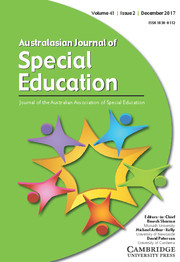Crossref Citations
This article has been cited by the following publications. This list is generated based on data provided by
Crossref.
Abawi, Lindy
and
Oliver, Mark
2013.
Shared pedagogical understandings: Schoolwide inclusion practices supporting learner needs.
Improving Schools,
Vol. 16,
Issue. 2,
p.
159.
Rutherford, Gill
2014.
Tales from School.
p.
239.
Chambers, Dianne
2015.
Working with Teaching Assistants and Other Support Staff for Inclusive Education.
Vol. 4,
Issue. ,
p.
3.
Stivers, Jan
and
Cramer, Sharon
2015.
Working with Teaching Assistants and Other Support Staff for Inclusive Education.
Vol. 4,
Issue. ,
p.
27.
Giangreco, Michael F.
and
Suter, Jesse C.
2015.
Precarious or Purposeful? Proactively Building Inclusive Special Education Service Delivery on Solid Ground.
Inclusion,
Vol. 3,
Issue. 3,
p.
112.
Hurrell, Derek
and
Day, Lorraine
2015.
Working with Teaching Assistants and Other Support Staff for Inclusive Education.
Vol. 4,
Issue. ,
p.
153.
Chopra, Ritu V.
and
Uitto, Denise J.
2015.
Working with Teaching Assistants and Other Support Staff for Inclusive Education.
Vol. 4,
Issue. ,
p.
175.
Holland, Kate
2015.
Disability Studies.
p.
43.
Němec, Zbyněk
Šimáčková-Laurenčíková, Klára
Hájková, Vanda
and
Strnadová, Iva
2015.
‘When I need to do something else with the other children, then I can rely on her’: teaching assistants working with socially disadvantaged students.
European Journal of Special Needs Education,
Vol. 30,
Issue. 4,
p.
459.
Giangreco, Michael F.
and
Doyle, Mary Beth
2015.
Italy presses forward in educating students with learning disabilities.
Phi Delta Kappan,
Vol. 97,
Issue. 3,
p.
23.
MacArthur, Jude
and
Rutherford, Gill
2016.
Success for All? Re-envisioning New Zealand Schools and Classrooms as Places Where ‘Rights’ Replace ‘Special’.
New Zealand Journal of Educational Studies,
Vol. 51,
Issue. 2,
p.
157.
Kyriakides, Andreas O.
and
Houssart, Jenny
2016.
Paraprofessionals in Cyprus and England: perceptions of their role in supporting primary school mathematics.
Research in Mathematics Education,
Vol. 18,
Issue. 3,
p.
249.
Butt, Rosemary
2016.
Teacher assistant support and deployment in mainstream schools.
International Journal of Inclusive Education,
Vol. 20,
Issue. 9,
p.
995.
Banerjee, Rashida
Chopra, Ritu V.
and
DiPalma, Geraldine
2017.
Early Intervention Paraprofessional Standards: Development and Field Validation.
Journal of Early Intervention,
Vol. 39,
Issue. 4,
p.
359.
Barrio, Brenda L.
and
Hollingshead, Aleksandra
2017.
Reaching Out to Paraprofessionals: Engaging Professional Development Aligned With Universal Design for Learning Framework in Rural Communities.
Rural Special Education Quarterly,
Vol. 36,
Issue. 3,
p.
136.
Crowe, Kathryn
Cumming, Tamara
McCormack, Jane
Baker, Elise
McLeod, Sharynne
Wren, Yvonne
Roulstone, Sue
and
Masso, Sarah
2017.
Educators’ perspectives on facilitating computer-assisted speech intervention in early childhood settings.
Child Language Teaching and Therapy,
Vol. 33,
Issue. 3,
p.
267.
Singer, George H. S.
Agran, Martin
and
Spooner, Fred
2017.
Evidence-Based and Values-Based Practices for People With Severe Disabilities.
Research and Practice for Persons with Severe Disabilities,
Vol. 42,
Issue. 1,
p.
62.
Sailor, Wayne
2017.
Equity as a Basis for Inclusive Educational Systems Change.
Australasian Journal of Special Education,
Vol. 41,
Issue. 1,
p.
1.
Metatla, Oussama
and
Cullen, Clare
2018.
“Bursting the Assistance Bubble”.
p.
1.
Jones, Eli
Larsen, Ross
Sudweeks, Richard R.
Young, K. Richard
and
Gibb, Gordon S.
2018.
Evaluating Paraeducator-led Reading Interventions in Elementary School: A Multi-Cutoff Regression-Discontinuity Analysis.
Journal of Research on Educational Effectiveness,
Vol. 11,
Issue. 4,
p.
507.


